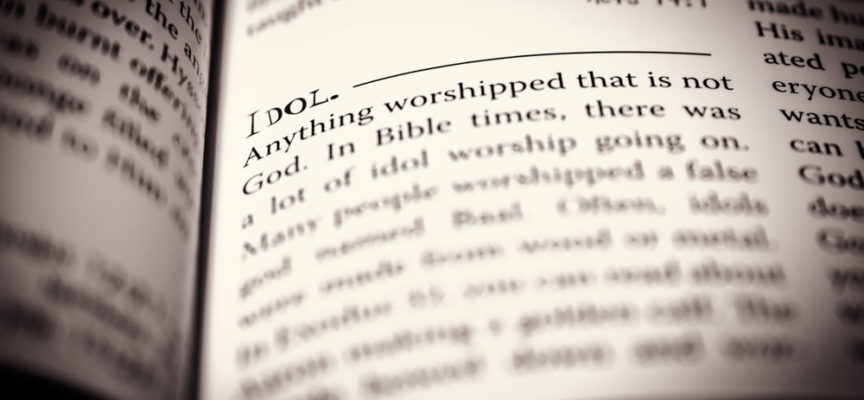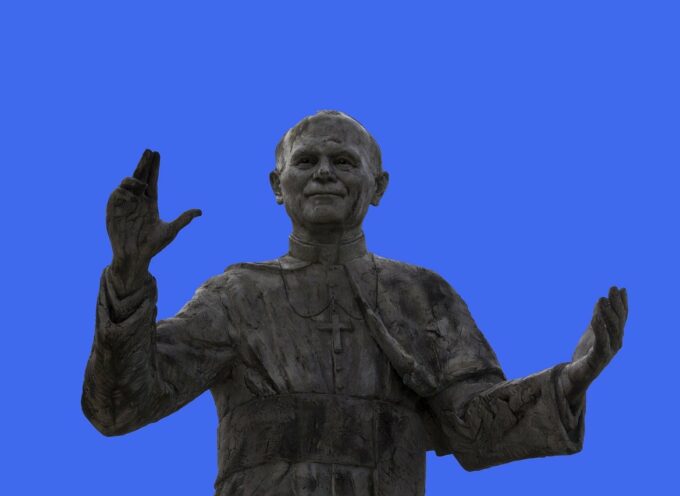During winter of this year, I began a research project on idolatrous political movements, reading and re-reading texts such as Raymond Aron’s The Opium of the Intellectuals, Mircea Eliade’s Myth of the Eternal Return, Ryszard Legutko’s The Demon in Democracy, and Hannah Arendt’s Origins of Totalitarianism. These books focused on the evils of Communist socialism and nationalist socialism, while sometimes also treating the ills of political liberalism.
During the spring, however, my attention turns to idolatrous political movements regnant in post-Cold War democratic liberalism. As I read, I’ll post brief summaries of some of the best books. This post represents the first installment, a brief treatment of Daniel Mahoney’s The Idol of Our Age: How the Religion of Our Age Subverts Christianity (New York: Encounter Books, 2018). I’ll begin with a brief summary of his overall argument, proceed with a concise overview of each chapter, and conclude with a few comments of my own.
How “The Religion of Our Age” Subverts Christianity
The subtitle of Mahoney’s book is “How the Religion of Our Age Subverts Christianity,” and as Mahoney demonstrates, the religion of our age is what can be called “humanitarianism” or “the religion of humanity.” And when he speaks against humanitarianism, he is not speaking against doing good deeds for people in need. Instead, he is using the term to describe a political ideology.
In this ideology, human beings are envisioned as intrinsically good, peaceful, and unified. Yet, our original goodness has been corrupted by the rise and development of nation-states. These nation-states are representative of everything that is wrong with humanity. They foster warmongering, religious divisions, economic disparity, and other evils. Thus, as the argument goes, we must bring peace and unity to the world by minimizing or obliterating the nation-state, weakening or undoing its borders, and fostering among global humanity the sense of camaraderie we would have felt if we had not been corrupted by civilization.
This vision of humanity, which is found prototypical form in Immanuel Kant’s Perpetual Peace and finds proponents today among elite actors in the European Union, the United States, and the United Nations, is squarely at odds with the Christian faith, offering an essentially a-theistic view of life, a false anthropology, and a heretical and utopian eschatology.
Mahoney makes his case over the course of eight chapters, each of which I summarize very briefly.
1. The Humanitarian Subversion of Christianity and Authentic Political Life
In the first chapter, Mahoney argues that French philosopher Auguste Comte (1798-1857) is the father of modern humanitarian religion. Comte thought he could transform the world order “from a theological and military order to a scientific and industrial one.” He thought he could unify peoples and nations because he believed that humans are intrinsically good beings who are held down by the systemic corruption of nations and institutions.
Comte constructed an abstracting ideology that undermines concrete people, associations, communities, nations, and religions. He stridently opposed metaphysics and theology, arguing that we should seek to understand humanity and save humanity without reference to a God or a divine salvation.
Comte even wrote a catechism and a calendar of great men to undergird his new secular religion. Mahoney notes that Comte excluded Jesus from the calendar, suggesting that perhaps Comte viewed himself as replacing Jesus. For Comte, de-Christianization and depoliticization are essential to building a one-world unity. Unity cannot be mediated by political and religious institutions.
After briefly describing Comte, Mahoney draws upon French philosopher Raymond Aron to expose the circumambient imbecility of Comte’s secular religion, especially Comte’s utopian vision of eradicating the political sphere so that wars and tensions would cease. He further criticizes Comte’s pantheistic vision in which a one-world administrative state synthesizes all nations in a borderless pacifistic utopia.
Aron further exposes the Comte’s deficient understanding of love. Having discarded Christianity’s sturdy agape love that is directed at God and at particular human beings, Comte conceives of love as a kind of sentimentality for humanity in the abstract.
Mahoney criticizes Comte on a number of counts, but especially for his refusal to recognize that “what is highest in man finds its ultimate source in what is higher than man” (9) and for his insistence of abolishing what is essential to humanity’s flourishing—life within particular communities and nations that “‘mediate’ and ‘concretize’ our sense of the universal” (8).
Mahoney writes:
Comte…[is] the half-deluded theorist of a secular religion that remains the temptation of our age. The humanitarian lie is in important respects less horrifying than the totalitarian one, but it is rooted in the same contempt for the political nature of man and the same ignorance of the human soul…. At its [the ideological lie’s] center is a willful denial of the political and spiritual nature of man in any substantial sense of the terms (13).
2. Orestes Brownson: From the Religion of Humanity to Catholicism and Constitutional Republicanism
In the second chapter, Mahoney draws upon American intellectual Orestes Brownson (1803-1876), who rejected Comte’s secular religion after having been a proponent of it for many years. During the early years of Brownson’s career, he immanentized the eschaton (conceived of humanity’s future salvation as coming through human rather than divine means) and believed in humanity’s ability to make unlimited progress. He argued that this religion of humanity was really the essence of Christianity anyway.
It was Aristotle’s Politics that first showed him the vacuity of the humanitarian religion, providing Brownson with a better way of reflecting on the common good—drawing upon reason and experience rather than utopian sentiment—and showing him impossibility of achieving utopia through mass democracy and a borderless world. Through Aristotle’s tutelage, he realized the need for nations to submit to constitutional law and natural law.
Shortly after discovering Aristotle, Brownson converted to Catholicism and soon recalibrated his anthropology, arguing that God ruled the world though natural law, that humanity could understand and conform to that law with the help of society’s institutions. He also recalibrated his view of community, arguing that God intends for human beings to live within concrete communities in which they seek the common good. Finally, he recalibrated his view of political action, arguing that Christians must redress social ills but should do so through reforming society and culture rather than through revolutionary means.
3. Soloviev on the Antichrist or the Humanitarian Falsification of the Good
Whereas Mahoney draws upon Brownson to criticize the political unviability of humanitarian religion, he draws upon Russian Orthodox intellectual Vladimir Soloviev (1853-1900) to criticize this secular religion spiritually and morally. Soloviev rejected Comte’s historicism, immanentization of the eschaton, and utopian political vision as a demonic falsification of God’s program for humanity.
Soloviev singled out Leo Tolstoy for being a pseudo-Christian proponent of humanitarian religion. Tolstoy viewed the Sermon on the Mount as a sort of political program that made Christianity politically passive and delegitimized the use of the “sword” against evil and injustice. Soloviev rejected Tolstoy’s humanism as a twisted and weak ideology that misunderstood the deadly threat of evil and the necessity of fighting that evil, if necessary, through warfare.
Mahoney writes:
The Christian God is both transcendent and incarnate. He promises something much more precious than bread and circuses, or even social justice, which in its quasi-socialist forms is inseparable from an excessive passion for equality, and even an encouragement of envy (64).
4. The Humanitarian Ethos
In the fourth chapter, Mahoney delves deeper into secular and pseudo-religious versions of humanitarianism, criticizing them on a number of counts, including their tendency to foster an ironic combination of relativism and moralism (68). Mahoney’s point reminds me of Charles Taylor’s description of the West’s “extreme moral inarticulacy.” Westerners have learned to manage life without any real reference to God or his moral law. As a result, we have nothing substantial with which to undergird our moral views or persuade other people to our view.
On the one hand, we have lofty and even utopian ideals—abolish warfare, end poverty, achieve justice and equality for all. On the other hand, we can’t fund those ideals with anything other than self-authorization. It’s no surprise, therefore, that the only thing we can do is shout each other down.
Mahoney draws upon Soviet dissident intellectual Aleksandr Solzhenitsyn (1918-2008) to argue that “soft humanitarianisms” (e.g. the garden variety sorts found in liberal democracies) are uniquely vulnerable to appropriation by “hard humanitarianisms” (e.g. authoritarian and totalitarian movements).
Mahoney further draws upon Hungarian philosopher Aurel Kolnai (1900-1973) to show why soft humanitarianisms are susceptible. They cloud our moral vision by denying God’s revelation of a transcendent moral law and by refusing to recognize the evil within the human heart (69). They underestimate evil and therefore succumb easily to it.
5. Solzhenitsyn’s Red Wheel: A Tough-Minded and Humane Christian Vision
In the fifth chapter, Mahoney returns again to Solzhenitsyn, who brilliantly assailed both secular and pseudo-religious forms of the humanitarian religion. His Gulag Archipelago attacked the hard despotism of humanitarian religion while The Red Wheel goes after the soft humanitarianism of Tolstoy. He argues that Tolstoy’s soft heresy paved the way for Lenin and Stalin’s hard version. Tolstoy has love for humanity in the abstract but contempt for his own nation, Russia. Tolstoy underestimates evil and thus is socially passive and even pacifist.
Mahoney quotes Father Severyan, a character in Solzhenitsyn’s The Red Wheel:
At no time has the world been without war. Not in seven or ten or twenty thousand years. Neither the wisest of leaders, nor the noblest of kings, nor yet the Church—none of them has been able to stop it.” And again, “War is the price we pay for living in a state. Before you can abolish war you will have to abolish all states. But that is unthinkable until the propensity to violence and evil is rooted out of human beings. The state was created to protect us from violence (83).
6. Pope Francis’s Humanitarian Version of Catholic Social Teaching
In chapter six, Mahoney argues that Pope Francis has been formatively influenced by humanitarian religion, importing it syncretistically into Catholic social teaching. Mahoney writes, “The consensus around Pope Francis is selective and tends toward the ideological. His admirers, and the pope himself sometimes, confuse Christian charity with secular humanitarianism” (91).
Like the humanitarians, he rarely speaks of repentance (109). Like the humanitarians, he focuses on grand social projects, prefers centralized government, is deferential toward authoritarian leaders, and doesn’t take seriously the cultural threat represented by Islam.
7. Jürgen Habermas and the Postpolitical Temptation
In the very brief seventh chapter, Mahoney argues that German philosopher and sociologist Jürgen Habermas (b. 1929) is the quintessential contemporary humanitarian thinker. Habermas envisions a secularized and apolitical Europe that will one day become part of a supranational administrative state. In this state of affairs, economic globalization will be replaced through political globalization on the largest possible scale. He is absolutely convinced that his emancipatory cosmopolitanism will win the day. If Habermas’ vision were to win the day, Mahoney argues, both religion and politics would suffer.
8. Reason, Conscience and the Return to Truth
In the final chapter, Mahoney argues that Western nations must return to their Christian roots, together with Christianity’s attendant spiritual, moral, and rational norms. We must cultivate wisdom of the sort that Solomon requested and often exhibited. Through the cultivation of such wisdom we can renew our nations and develop a politic that unifies religion and reason.
If we do not renew our nations and base our vision of the good life on transcendent moral law, tyranny will arise. Drawing upon Solzhenitsyn who blamed the twentieth century’s disasters on the fact that “men have forgotten God,” Mahoney argues that, “comprehensive relativism, the denial of God and a natural order of things, and not some alleged absolutism, is at the source of the worst tragedies of the twentieth century” (124).
Mahoney concludes:
Only by reconnecting truth and liberty, politics and conscience, can modern man free himself from what C. S. Lewis called ‘the poison of subjectivism.’ By pursuing such a reconnection, we might take some sure-footed steps toward delivering on the promise of a liberty worthy of man. In doing so, we can begin to repel the humanitarian subversion of Christianity—and of authentic political life (127).
Refusing to Bow to False Political Gods
Mahoney’s book is a significant contribution to the field, especially as an exercise in excavating the idolatry beneath modern political ideology. Just as Israel was tempted to worship false political gods in every era (tribal confederacy, monarchy, diaspora) of her life, so all of humanity is tempted to bow before political idols.
The Idol of Our Age is especially helpful in showing that once the West severed social order from sacred order, the disastrous result is a comprehensive relativism that views human beings as intrinsically good, blames the world’s evils on systems and political arrangements rather than human depravity, and seeks a salvation as provided by humanity for humanity.
In response, Christians should seek to persuade our neighbors of the truth of Christianity, the Lordship of Christ, and the existence of the moral law. We should remind them that evil arises from within the human heart; although cultural institutions and governments are indeed warped and corrupted by human sin, they are not the source of sin. Finally, as Mahoney argues, we should draw upon the Bible’s affirmation of both universality and particularity, and consequently it’s affirmation of unity-in-diversity rather than unity-without-diversity. When Christ returns, he will affirm the particularity of his worshipers (from every tribe, tongue, people, and nation) even while unifying them under his reign. And in the meantime, until he returns, we do well to realize that it is through the particularities of our existence—families, neighborhoods, communities, institutions, and nations—that we are shaped and even become aware of our common humanity.
Subscribe
Never miss a post! Have all new posts delivered straight to your inbox.







